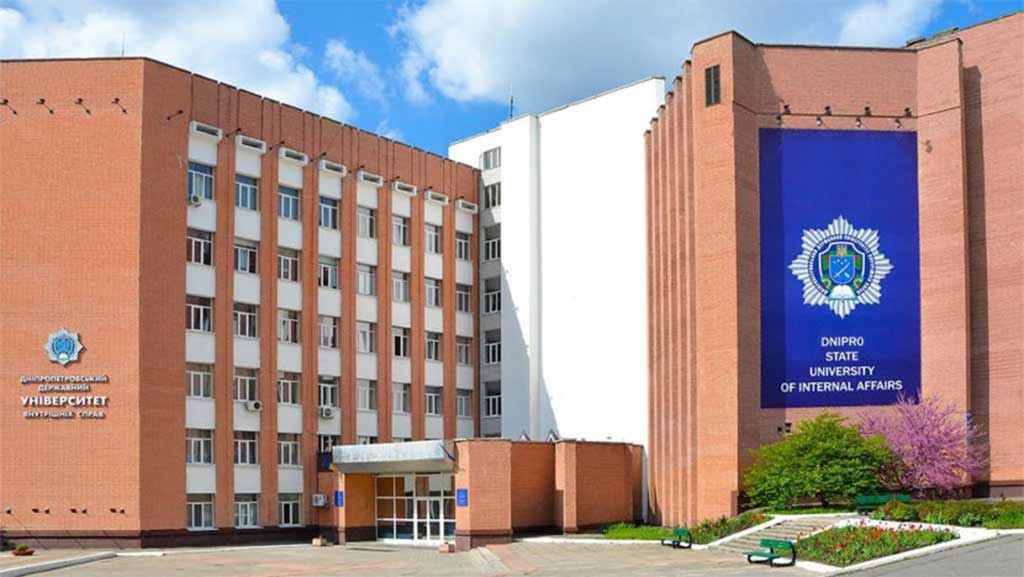
Dnipro State University of Internal Affairs (DSUIA) is a higher education institution under the Ministry of Internal Affairs of Ukraine with specific training conditions. Throughout its existence, the institution has evolved from Dnipro Special Police High School to Dnipro State University of Internal Affairs, founded on September 8, 2005.
Under the order №298 of the Ministry of Internal Affairs, the university was renamed Dnipro State University of Internal Affairs in May 2024.
DSUIA is one of the leading higher education institutions within the MIA system, with over 35,000 graduates. The main educational units comprise two educational and research institutes, two faculties, and the Institute of Postgraduate Education and Distance Learning.
The educational and scientific activity of the university is provided by twenty departments. According to the license, the university offers the following specialties: Economics (051), Psychology (053), Management (073), Law (081), Law Enforcement (262), Public Management and Administration (281), International Relations, Public Communications, and Regional Studies (291). Applicants are offered general legal disciplines as well as special disciplines that are taught exclusively in higher education institutions of the Ministry of Internal Affairs. The DSUIA offers a full training cycle.
In 2024, Dnipro Lyceum of Security Orientation and National Patriotic Education of the Ministry of Internal Affairs was established as a separate structural unit based on DSUIA in 2024. The lyceum is attended by children of fallen, injured, or missing employees and servicemen of the Ministry of Internal Affairs and the Security and Defense Forces of Ukraine, as well as children of combatants. The initial enrollment of students amounted to 150.
The university promotes equality, freedom, and a barrier-free learning environment, providing educational services on the principles of non-discrimination, diversity, effective involvement, and inclusion of all participants in the educational process. Aligned with the National Strategy for Barrier-Free Education, the educational institution has created appropriate conditions for comfortable learning for students with disabilities. Within the framework of Olena Zelenska’s initiative “Without Barriers”, the institution operates a Driving School for people with disabilities. The school trains drivers with musculoskeletal disorders, primarily military personnel who were injured and amputated as a result of Russian aggression. At the Driving School, military personnel can receive Category B and C1 driver’s licenses.
The university actively develops veteran sports. Since the beginning of 2024, experienced specialists and coaches of the university have been conducting classes in table tennis, mixed martial arts, sitting volleyball, firearms training, etc. The university strives to provide comprehensive support to veterans, providing social adaptation and physical rehabilitation considering individual needs.
Considerable attention is paid to the development of physical culture and sports in the work with personnel. To achieve this goal, all conditions for the comprehensive development of the individual have been created at the DSUIA. The university annually graduates athletes from among higher education students who receive titles of champions of Ukraine, Europe, and the world while studying.
In response to current challenges, DSUIA has intensified its military and tactical training programs. Programs for military and professional training of cadets (fire, tactical and engineering training, topography, tactical medicine), individual and small group work have been implemented. Humanitarian demining training for cadets is systematically conducted. The cadets of DSUIA are regularly involved in protecting the state border and ensuring public safety and order.
The practical component has been strengthened within cooperation with the National Police of Ukraine through involving cadets in the work of the National Police of Ukraine.
Joint exercises are held with representatives of the National Guard of Ukraine to improve military training and response in conditions close to combat.
The training of cadets of DSUIA is enhanced by tactical medicine, military and professional training, UAV operator training, and training to work with people with PTSD. The knowledge and skills of specialists with experience in the liberated territories are actively incorporated into the educational process.
On the territory of the university there are educational and training grounds: “Combating Organized Crime and Corruption”, “Preventing and Combating Domestic Violence”, “Tactical Town”, tactical medicine training ground, “Road Safety”, “Child-Friendly Crisis Room”, and forensic training ground, “A car with traces of bullets and debris”, “Burial site”, “Mass shooting site”, “Civilian infrastructure destruction site”, “Shelling site”, “Ammunition and explosive remnants site”, “Torture room”. A classroom for identifying explosive devices, a digitalization center, a center for cybersecurity, cyber hygiene, and countering cyberbullying, as well as a psychological training center have been set up.
An important aspect of our activities in the context of Russian aggression is national and patriotic education:
• holding meetings of military personnel and war veterans with applicants and lyceum students to raise the prestige of military service and cultivate an attitude towards military personnel as defenders of the Fatherland;
• establishment of memorial stands at the university to honor the fallen heroes;
• organizing and holding patriotic events;
• donor and volunteer assistance (blood donations, making camouflage nets, trench candles, assistance in hospitals, etc.).
Research and international activities are an essential component of educational activities:
• the focus of research and development has been shifted to solving urgent practical problems of law and order protection, critical infrastructure protection, and implementation of innovative projects;
• increase the share of research conducted by the university at the request of practical units of the Ministry of Internal Affairs and the National Police, and implement research results into practical activities of the relevant divisions;
• involvement of international experts and specialists to improve the competence of teachers, considering the requirements for police training during the period
Dnipro State University of Internal Affairs responds flexibly to the challenges of today and works proactively to implement the necessary elements in the educational process for training future law enforcement officers.

